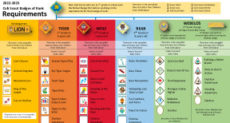 If you’ve ever transitioned from being a rank-and-file employee to a supervisor or manager, you’ve undoubtedly run into some rough spots as you made the transition. Taking on a managerial role is a big step, because you’re now overseeing the people you used to work alongside.
If you’ve ever transitioned from being a rank-and-file employee to a supervisor or manager, you’ve undoubtedly run into some rough spots as you made the transition. Taking on a managerial role is a big step, because you’re now overseeing the people you used to work alongside.
The same sort of thing can happen if you find yourself nominated, selected or volunteered to be the committee chair of your unit. Your chartered organization probably picked you because of your dedication to Scouting and knowledge of the program, your unit and your fellow committee members. But that’s no guarantee that you’ll work smoothly with them as their new chairman.
Aside from the mechanics of the job – selecting adult leaders, chairing the committee meetings, interfacing with the chartered organization – what situations are you likely to encounter? Executive coach Ed Batista took a look at the problems a new chief executive officer of a corporation might run into without anticipating the ramifications of the move. In an article in Harvard Business Review, Batista takes us into three likely situations and gives advice on what to do. Since, as the committee chair, you are essentially the CEO of the pack or troop, these situations might also apply to you.
- You may encounter greater scrutiny in the things you do. People will look at you not so much as the individual but in the role you hold. They’ll come to rely on you for many things – answers to questions, procedural matters, interpretations of policy – and they might evaluate or challenge the things you say or do. Keep in mind that they are probably not scrutinizing you so much as the function of the chairperson. A good way to guard against misinterpretation is to know your role and the program and policies, so you can correctly and fairly implement them. Understand that your actions may intimidate others; by being fair, transparent, and even humble or self-deprecating, you can help others feel more comfortable dealing with you.
- You’re not likely to get as much direction and feedback from others. You’re at the top, and you function as part of the “Key 3” of your unit, along with the chartered organization representative and the unit leader (Cubmaster or Scoutmaster). While an experienced unit leader will help you understand the program from the point of view of supporting the youth, the helping hand guiding you in your job won’t always be there. Rely on your unit commissioner and other committee chairs to help you understand your function and give you advice from those who have already been down that road.
- The third caution that Batista has is to be wary of a lack of empathy from others. It’s hard to empathize up, he says, as you may have encountered when trying to relate to your boss. While some may be able to see what your situation holds, you may also find critics with no sense of what your responsibilities and limitations are. Try showing some vulnerability – a sense that you’re not an authoritarian and the things you say and do aren’t necessarily immutable. This can help others relate to you and give them a greater understanding of the mission at hand.
Your fellow Key 3 members should share in a sense of responsibility for the success of your unit and give you the support you need. While the unit leader concentrates on program and youth matters, the committee chair tends to the business and supports the program through committee functions. The Scoutmaster or Cubmaster can help you by clearly articulating his or her needs and offering ways to achieve that outcome. The chartered organization representative brings support from your sponsoring organization. Together, you can arrive at a path to follow toward a more successful unit.
How did you acclimate yourself to your new role as committee chair? Leave a comment or an observation.
Image: FutUndBeidl / Creative Commons license
This post first appeared on Bobwhite Blather.




I was asked to serve as Troop Committee Chair because the previous one was moving. I had no opportunity to shadow or learn from anyone. I have been in this role for about 8 months now and am not having any luck recruiting other adult leaders to fill Committee roles.
What are some of the best resources to help me engage with our Troop’s adults?